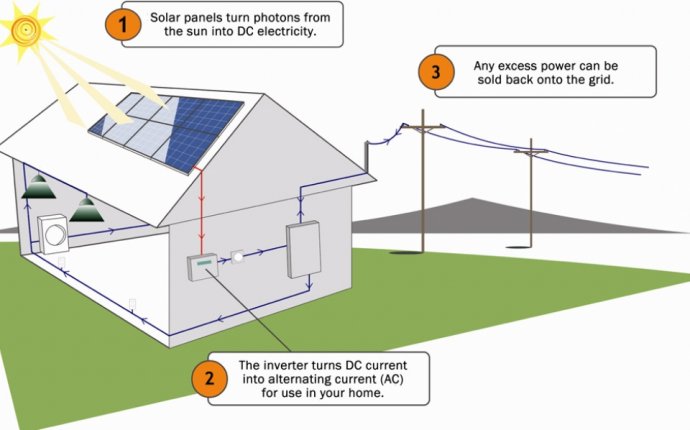
Home solar Power Systems
Not all residential solar power systems are the same. There are a number of different options you can choose for your home solar power system, ranging from placement and material to grid connection and battery choices. While there are many distinctions between residential solar power system options, the three main types of home solar power systems are:
- Grid tied residential solar power systems (the most common type of home solar power)
- Grid tied residential solar power systems with batteries
- Off grid residential solar power systems
Read on to learn more about each of these types of solar power systems for the home. You’ll also learn about other factors you should consider when choosing the residential solar power system that’s right for your home.
Grid Tied Residential Solar Power Systems
Grid connected home solar power systems without batteries are the most common types of residential solar power used today. This type of solar power system is the most affordable to purchase as well as the easiest to design and install, which makes them so popular. They have the fewest components and are the simplest to use and install.
Of course, without a battery, solar home owners will not be able to store any excess solar power. Stored power can be used during an emergency, blackout, or when solar panels are not generating power, such as overnight. But without a battery, the electrical grid is your backup.
Without storage for excess power, this energy will be sent to the grid. When you need power, but your solar power panels aren’t currently producing the energy you need, you’ll purchase your power from the grid rather than draw on stored power in a battery. Most home owners are able to take advantage of net metering in this situation, wherein you’ll receive a bill credit for the excess power you feed back in to the grid, and use that same credit to purchase grid power when your solar power isn’t enough.
Unfortunately, if grid power goes out, solar homeowners on a grid tied residential solar power system without a battery will also lose power. Your inverters will disconnect from the utility grid as soon as power goes out for safety reasons.
Pros of Grid Tied Residential Solar Power Systems:
- The most affordable home solar power system
- Easy to install
- Makes it possible to take advantage of financial incentives including net metering
- Uses the utility grid as a backup when solar power isn’t enough
Cons of Grid Tied Residential Solar Power Systems:
- When grid power goes out, so does your solar power system. This is true even if sunlight is available and you could generate solar power
- Excess energy is sent to the grid, not a battery. Home owners may not be paid back for this energy at the full retail rate
- Grid tied systems may be subject to utility fees
Grid Tied Residential Solar Power Systems with Batteries
Grid tied solar power systems with batteries are less common than those without batteries. Often, these systems are significantly more costly and difficult to install, and some home owners encounter resistance from utility companies when installing this type of system.
With a battery grid tied solar power system, you’ll be able to use your battery bank as a backup as well as the grid. Your solar power system will first store any excess solar power in your battery, then send extra power on top of that to the grid once your battery is fully charged.
If the power goes out on the grid, your system will go to an off grid mode and use the solar power that is currently generated by your solar panels, as well as power from your battery bank as a backup. This is very useful in case of an emergency.
Pros of Grid Tied Residential Solar Power Systems with Batteries:
- More affordable than completely off grid systems
- Offers both battery and the grid as a backup, ensuring reliable power
- Allows home owners to use their own power during a power outage
- Likely still eligible for solar power financial incentives









